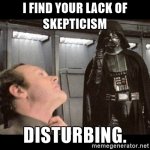Who exactly made up this figure, and what exactly did they get out of it? To deny history is a mug's game unless you have very good reason, and as far as I can see you have none whatever, except the desperate urge to do re-enactment of mid-Nineteenth-Century arguments with long-dead theologians.
There is the problem. Who
exactly is this Jesus and what
exactly did he actually do? To accept physics-denying activities is a fool's errand unless there is solid physical evidence, and as far as I can see there is none whatsoever, except the desperate urge of people like Lumpenproletariat to argue that the guy wouldn't be known today if it weren't for the miracles he did, therefore he must have done those very miracles. Circular reasoning with a garnish of appeal to popularity.
Meanwhile you come in with your minimalist approach and argue that this person
must have been an actual historical figure because skeptics cannot produce evidence to substantiate
exactly what those who made all this bullshit up were gaining from said making-up of bullshit.
The point is that nobody has to know exactly what the gain was in order to know that (1) people make up bullshit all the time; and (2) sometimes people do things for absolutely unfathomable reasons. For evidence of (1) just go to snopes.com. If you're too lazy to do that I'll appeal to a couple of in-thread examples: What the
fuck do the hooligans who ride dirt bikes on public roads in California gain by terrorizing innocent drivers attempting to get home at the end of a hard day's work? Yet gangs do these very things. Why do people spend hordes of time writing computer viruses, knowing that they need to remain anonymous? I don't understand this mentality either. Yet I know that people do both of these things and many others that I have no idea why. I don't have to know
why everyone does things I consider stupid to know that people do things I personally consider stupid.
For good measure I'll toss in the Barny and Betty Hill alien abduction stories. Why the
hell did they go to all that effort to make up such a story that any sensible person knows was a lie. Yet they did and they got others to corroborate. Multiply that 1000 times over for the crowd of "me-toos" that proliferated in the '60s and you've got a perfect parallel to the Jesus myth of the 1st century C.E.
I
know for a fact that almost every 15 minutes someone somewhere invents some new religious cult and people start following it. I know that fully 99% of these cults die out within a single generation. I have no idea why people do it, but it happens. I know that sometimes, once in a great while, one of these new cults makes it far enough into the big time to merit national attention. Applewhite, Knight, Koresh, Moon, Hubbard, etc. And sometimes (even more rarely) these cults go far beyond single generation cults and end up with major spreads. Joseph Smith, Mohammad, etc.
It is far more reasonable to assume that a charismatic cult leader named Paul began channeling a "Jesus" character who later was turned into a living flesh-and-blood person who had lived in recent history (a scenario that fits all available evidence) than to assume that Paul was talking about someone who had defied the laws of physics and medicinal technology, and had resurrected from actual death and levitated off into the sky never to be seen again.
This is what we in the "business" call "Being real."
For those who want to believe in Santa Claus of course, anything goes. Maaaaaaagic, magic, magic, magic, magic.

